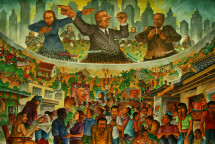Ideas into movement
Boost TNI's work
50 years. Hundreds of social struggles. Countless ideas turned into movement.
Support us as we celebrate our 50th anniversary in 2024.

Shedding light on Venezuela’s current situation, inquiring into food shortages, lines, and ‘riots'.

This piece aims to shed light on Venezuela’s current situation by employing a historical, relational and interactive approach to agrifood politics, with a focus on questions of power as related to race, class, gender and geography, as manifested in everyday practices around food. In doing so, we challenge dominant narratives around ‘authoritarian populism,’ by examining the differentiated impacts of the shortages and the visible and invisible forms of power driving them, through a complex web of relationships among state, society and capital.
We look at the past to understand the historical continuities of extractive patterns, with attention to how food has served as a means of creating and maintaining social differentiations over time, particularly the formation of a powerful elite, a middle class aligned with it, and a class of ‘others’. To understand the concentration of power in the food system, we focus in on the staple food of corn, as expressed through a maiz-harina-arepa complex. This leads us to emerging trends of authoritarian populism in Venezuela today, different from those portrayed in dominant narratives, stemming from elite alliances long in the making.
Key to these trends are the ways in which food is used to exert control over the majority of the population. Arguably, through processes of colonization, modernization, and today, globalization, the entire set-up of the modern industrial food system -- i.e., offering foods appealing to the tastes of the masses, but in a highly controlled and controlling way -- easily lends itself to being a tool of authoritarian populism, as seen in Venezuela today. The flip side is that food is also being used as a tool for resistance, manifested in a multitude of grassroots efforts. We explore these responses, and the hard questions they raise, emphasizing that today in Venezuela, the urgent tasks of the short-term are defining the contours of broader transformation in the long-term, and that it is within the everyday that the possibilities for emancipation exist.
This paper was presented at the Emancipatory Rural Politics Initiative (ERPI) 2018 Conference: "Authoritarian Populism and the Rural World"